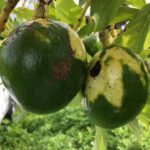UF research developing off-season blueberries

A newly published study by the University of Florida Institute of Food and Agricultural Sciences (UF/IFAS) is hoping to bring the Sunshine State’s blueberry supply to the fall season.
This comes as good news for consumers and growers, who would be able to expand their market window by several months.
The key, the study shows, are genetics. And so UF/IFAS researchers set out to determine “whether we could promote a profitable fall production in Florida,” says Patricio Muñoz, the blueberry breeder and a UF/IFAS associate professor of horticultural sciences.
“Blueberries are a short-day plant, meaning that flower organs are formed when days are short in the fall and then flower in the spring,” says Muñoz.
Scientists evaluated 536 varieties of the Southern Highbush Blueberry on two commercial farms in Waldo, located northeast of Gainesville, during the fall of 2019 and the fall of 2021, and found that blueberry crops are “day-length insensitive”, meaning that they should be able to produce fruit even on longer days.
Related articles: The light at the end of the tunnel for Florida’s orange industry
“We always observed a few varieties that will produce in the fall, meaning they have the capacity to develop flowers when days are long. So, we developed a study to determine whether we could promote a profitable fall production in Florida,” Muñoz adds.
“Our results tell us that there is a genetic mechanism operating in those off-season plants that is different from the conventional plants with the traditional spring flowering,” says Mariana Neves da Silva, who led the study as part of her doctoral dissertation under the supervision of Muñoz in the UF/IFAS College of Agricultural and Life Sciences.
How does this help Florida blueberry growers?
Florida blueberries grow abundantly in such counties as Alachua, Hardee, Hernando, Manatee, Orange, Polk and Putnam counties. However, typically, in the fall, U.S. shoppers can only find imported blueberries in most grocery stores.
“In the fall, blueberries are imported to the U.S., and prices can be high due to the lack of domestic production,” indicates Neves da Silva. “Producing blueberries in the fall could help Florida growers to reach that high-price market window by providing fresh blueberries. Further research is required in order to improve that trait, and also to gather more data regarding yield and management.”
In the future, horticultural scientists expect to develop cultivars and management practices.
“We are working with Dr. Gerardo Nunez, an assistant professor in horticultural sciences to develop the recommended management for these varieties,” Muñoz adds.










































